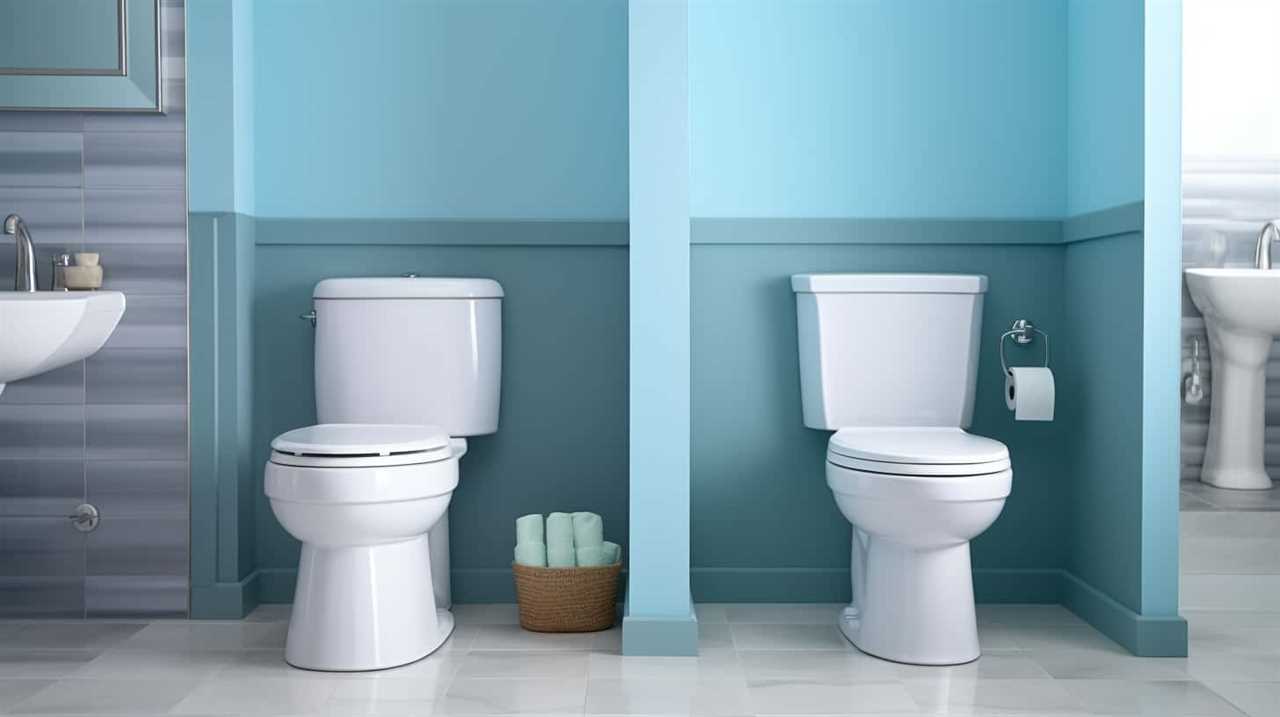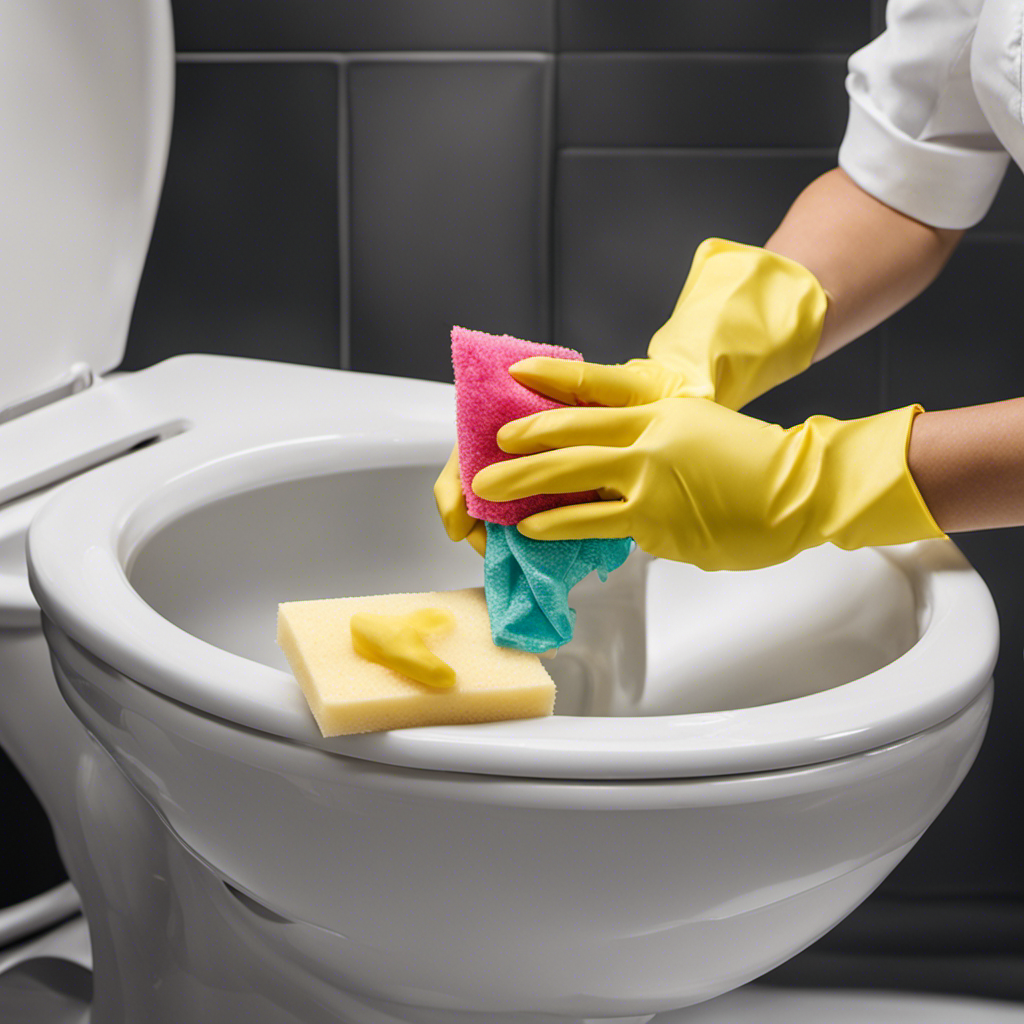As lovers of coffee, we frequently confront the quandary: can coffee grounds block a toilet?
In this article, we delve into the potential risks and impact of flushing coffee grounds down the drain.
By understanding the composition of coffee grounds and why they may not break down in water, we can make informed decisions about their disposal.
Join us as we explore alternatives and share tips for preventing toilet clogs, ensuring our plumbing remains pristine.

Key Takeaways
- Coffee grounds can accumulate and create sludge in toilet pipes.
- Accumulated coffee grounds can attract other debris, worsening the problem.
- Reduced water flow and blockages can result from coffee grounds in pipes.
- Proper disposal methods, such as composting, are recommended for coffee grounds.
How Coffee Grounds Can Affect Your Plumbing
Coffee grounds can have a detrimental impact on our plumbing systems. When disposed of improperly, coffee grounds can accumulate and cause blockages in pipes. This can lead to clogged drains and even potential damage to our plumbing infrastructure. Not only does this create inconvenience, but it also results in costly repairs.
To avoid these issues, it’s important to properly dispose of coffee grounds. Instead of flushing them down the toilet or throwing them in the sink, consider using them as garden fertilizer. Coffee grounds are rich in nutrients like nitrogen, potassium, and phosphorus, making them an excellent natural fertilizer.
The Potential Risks of Flushing Coffee Grounds
When it comes to disposing of coffee grounds, flushing them down the toilet can pose potential risks. While it may seem like a convenient way to get rid of the grounds, it’s important to consider the potential environmental impact and potential health hazards associated with this practice.
Here are some reasons why flushing coffee grounds down the toilet isn’t recommended:
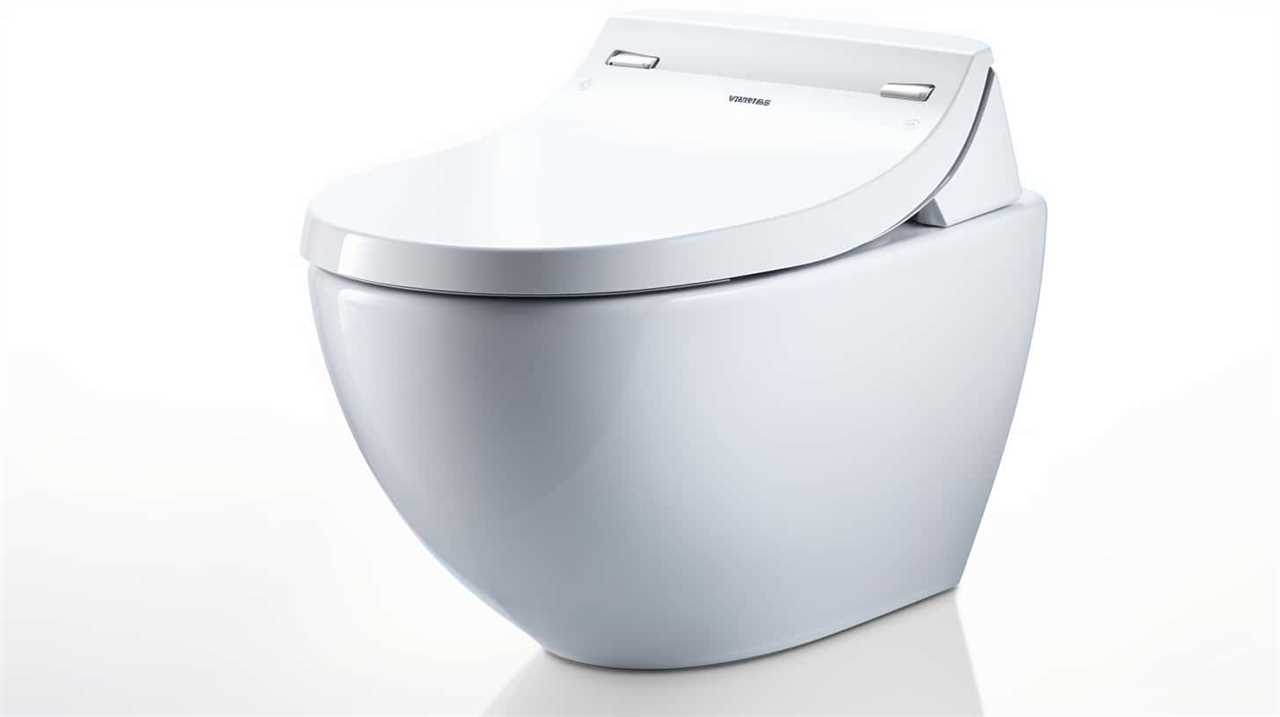
- Coffee grounds can accumulate in pipes and lead to clogs, causing costly plumbing issues.
- The wastewater treatment process may not effectively filter out coffee grounds, leading to potential harm to aquatic life.
- Coffee grounds can mix with other substances in the wastewater system, creating blockages and backups.
- Flushing coffee grounds can strain septic systems, potentially causing them to malfunction.
- Coffee grounds may contain oils and compounds that can interfere with the proper breakdown of waste in septic tanks.
It is important to dispose of coffee grounds properly to avoid these potential risks.
Understanding the Composition of Coffee Grounds
The composition of coffee grounds is a crucial factor to consider when discussing their potential effects on a toilet’s plumbing system. Understanding coffee bean roasting techniques is essential in comprehending the composition of coffee grounds.
Coffee beans undergo roasting, a process that involves heating the beans at high temperatures to develop their flavor and aroma. During roasting, the beans undergo chemical changes, resulting in the formation of various compounds. These compounds contribute to the composition of coffee grounds.
Additionally, it’s important to consider the environmental impact of coffee production. Coffee cultivation and processing can have significant environmental consequences, including deforestation, water pollution, and greenhouse gas emissions.
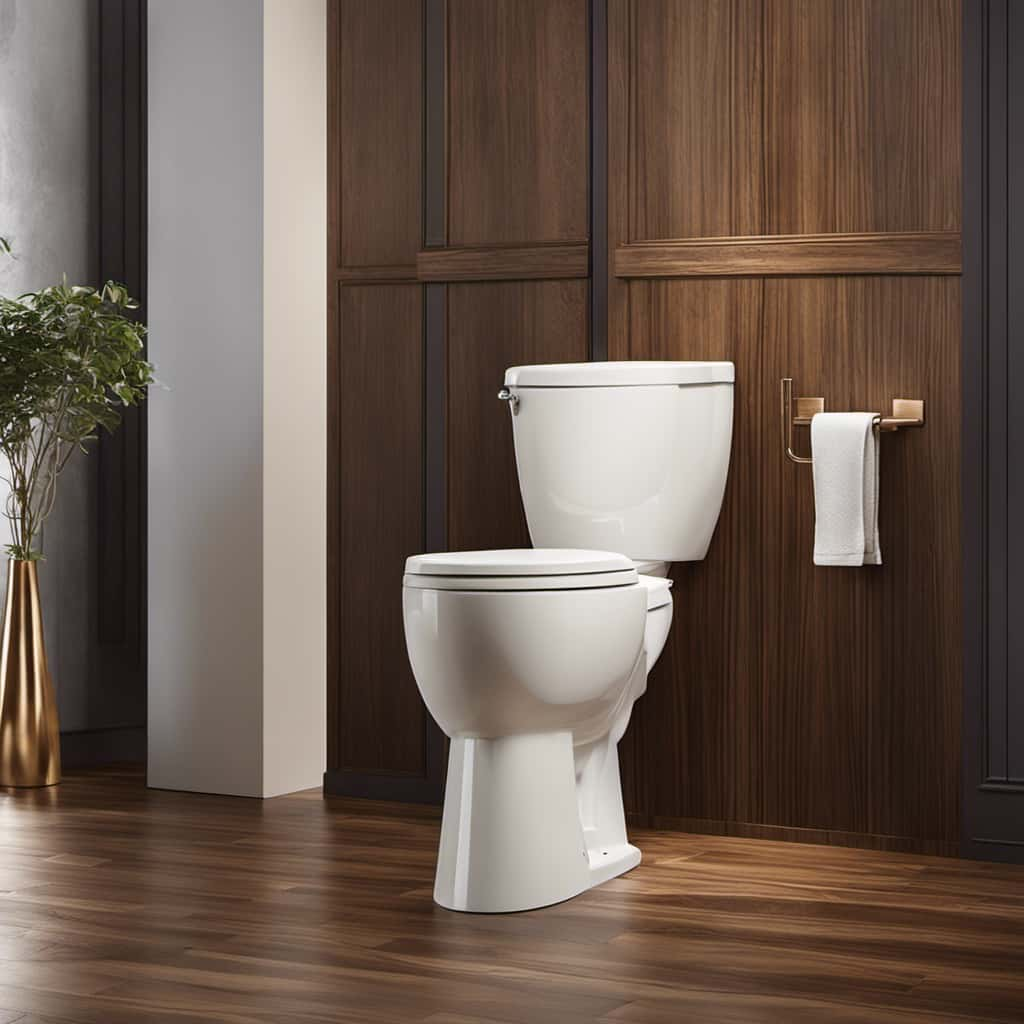
Why Coffee Grounds May Not Break Down in Water
After flushing, coffee grounds can accumulate and create blockages in the pipes due to their tendency to clump together rather than break down in water. The breakdown process of coffee grounds is hindered by several factors, contributing to their resistance to disintegration.
Here are some reasons why coffee grounds may not break down in water:
- High cellulose content: Coffee grounds contain a significant amount of cellulose, a complex carbohydrate that’s resistant to water and enzymes.
- Insoluble fibers: The insoluble fibers present in coffee grounds, such as lignin, make them less susceptible to water-based breakdown.
- Compaction: Coffee grounds have a tendency to compact and form dense masses, further impeding their breakdown in water.
- Oil content: The oils in coffee grounds can create a waterproof barrier around the particles, preventing water penetration and breakdown.
- Environmental impact: When coffee grounds accumulate in pipes, they can contribute to clogs and backups, leading to costly repairs and potential harm to the environment.
Understanding why coffee grounds may not break down in water can help prevent blockages and minimize their environmental impact.
The Impact of Coffee Grounds on Toilet Pipes
Toilet pipes can be significantly affected by the accumulation of coffee grounds, potentially leading to blockages and costly repairs. Coffee grounds, when flushed down the toilet, can pose a serious threat to the plumbing system. The impact on plumbing is twofold.

Firstly, coffee grounds don’t break down easily in water, which means they can accumulate and create a thick sludge that clogs the pipes. This can result in reduced water flow and even complete blockages.
Secondly, the accumulation of coffee grounds in the pipes can also attract other debris, such as hair and grease, further exacerbating the problem.
From an environmental standpoint, the disposal of coffee grounds in toilets also raises concerns. Coffee grounds are biodegradable, but they’re best suited for composting or disposal in the trash. When flushed down the toilet, they can enter the wastewater system and end up in bodies of water, potentially impacting aquatic ecosystems.
Additionally, the accumulation of coffee grounds in the pipes can hinder the proper treatment of wastewater, leading to potential environmental pollution.

Therefore, it’s essential to avoid flushing coffee grounds down the toilet to prevent both plumbing issues and environmental harm.
Alternatives to Disposing Coffee Grounds in the Toilet
One alternative to disposing coffee grounds in the toilet is to compost them. Composting coffee grounds not only prevents clogs in your toilet pipes, but also provides a sustainable solution for utilizing this common kitchen waste.
Here are five composting options to consider:
- Backyard compost bin: Create a designated area in your backyard where you can compost coffee grounds along with other organic materials, such as fruit and vegetable scraps.
- Vermicomposting: Use a worm bin to compost coffee grounds with the help of red worms. This method is ideal for those with limited outdoor space.
- Municipal composting: Check if your local municipality offers a composting program where you can drop off coffee grounds for proper disposal.
- Community gardens: Some community gardens accept coffee grounds for composting. This allows you to contribute to a larger composting effort and support local green spaces.
- Indoor composting systems: Utilize indoor composting systems, such as bokashi bins, to compost coffee grounds and other kitchen scraps in a controlled environment.
Proper Ways to Dispose of Coffee Grounds
To properly dispose of coffee grounds, we can follow a few simple steps.
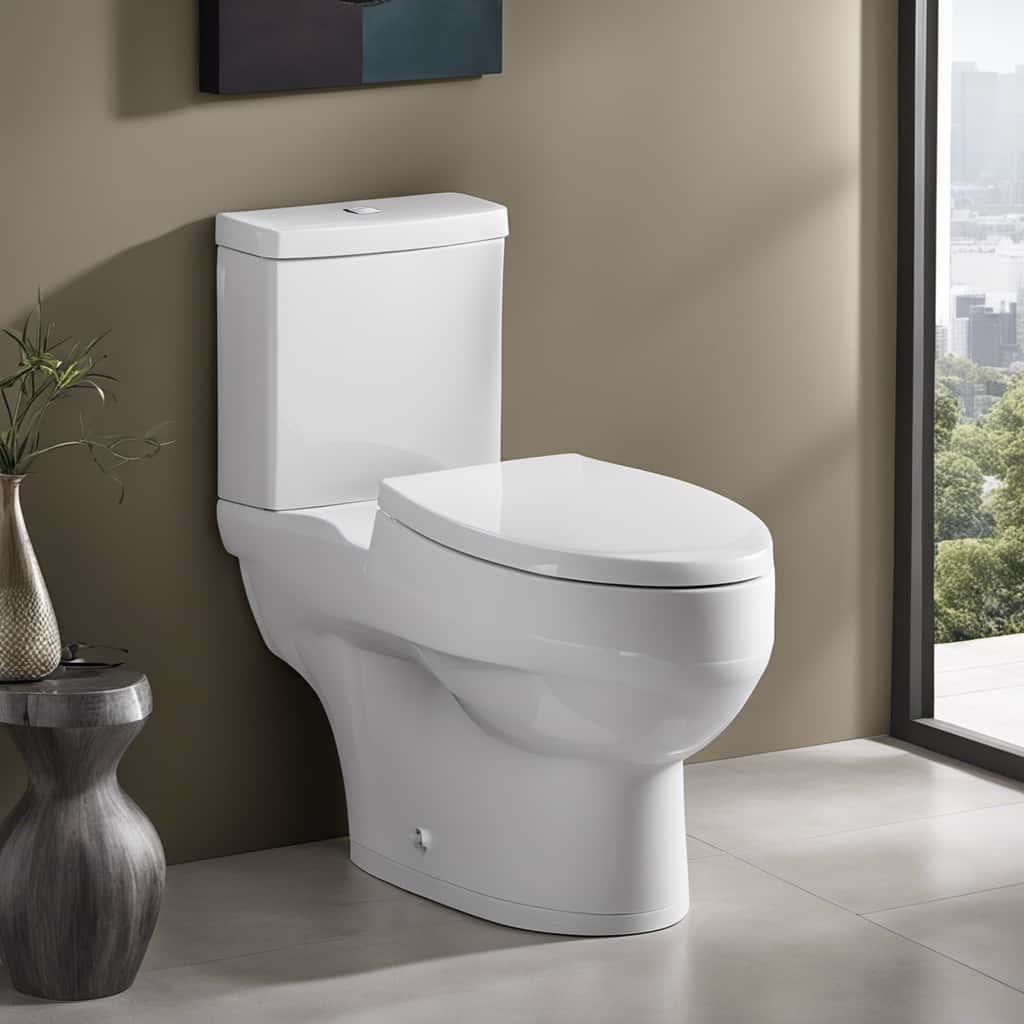
First, consider composting the grounds. Coffee grounds are rich in nitrogen and make an excellent addition to compost piles. Just mix them with other organic materials and let nature do the rest.
Another option is to use coffee grounds as a natural fertilizer for your plants. Sprinkle them around the base of your plants, and they’ll provide essential nutrients while deterring pests.
If composting or fertilizing isn’t feasible, coffee grounds can be safely thrown in the trash. However, it’s important to be mindful of the environmental impact. Coffee grounds can contribute to landfill methane emissions, so it’s best to limit the amount that ends up in the garbage.
Tips for Preventing Toilet Clogs
To prevent toilet clogs, it’s important to avoid flushing non-flushable items such as coffee grounds, wipes, and sanitary products. These items can easily block the pipes and cause major plumbing issues.
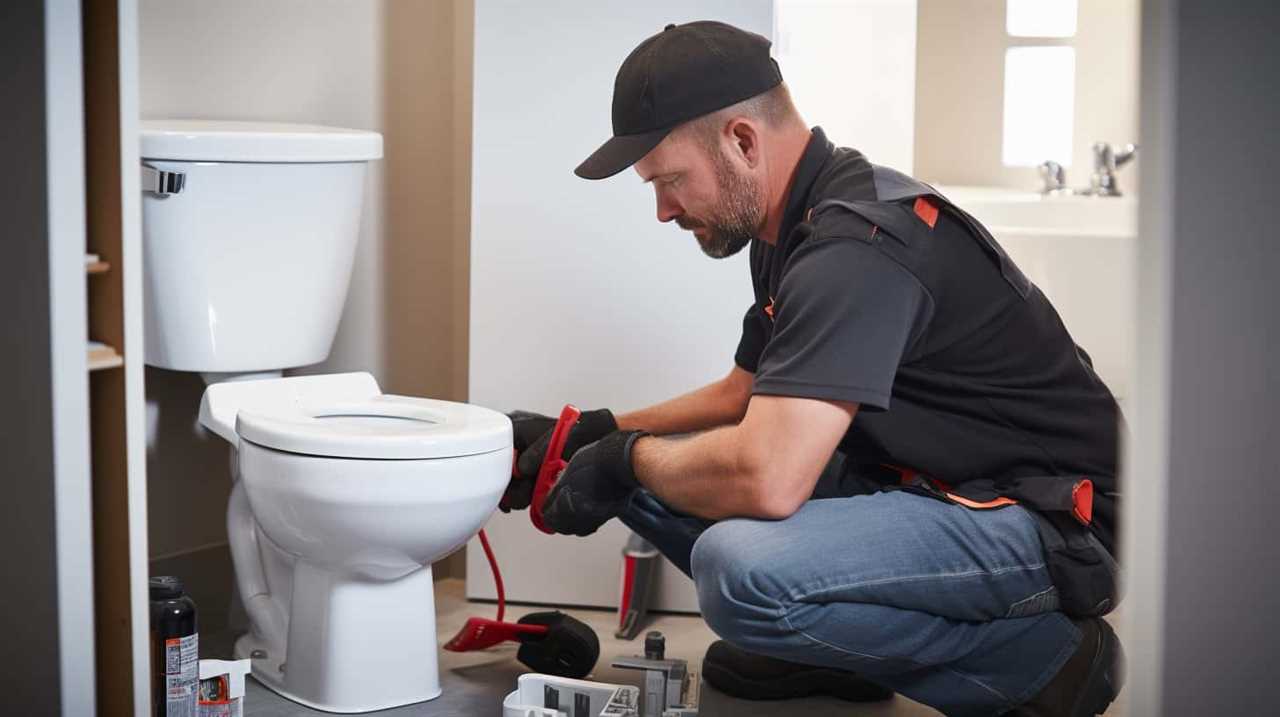
Additionally, regular maintenance and cleaning of the toilet can help prevent build-up and potential clogs.
Flushing Non-Flushable Items
We need to be careful about what we flush down the toilet to prevent clogs, as certain items that aren’t meant to be flushed can cause serious plumbing issues. Flushing non-flushable items can lead to potential clogs and have a negative environmental impact.
To ensure a clog-free toilet and minimize harm to the environment, consider the following tips:
- No wipes: Avoid flushing baby wipes, cleaning wipes, or any other type of wet wipes down the toilet. They don’t break down easily and can cause blockages in the pipes.
- No feminine hygiene products: Tampons, pads, and panty liners should never be flushed. They can expand and cause clogs in the plumbing system.
- No dental floss: Dental floss isn’t biodegradable and can wrap around other debris in the pipes, creating blockages.
- No medication: Flushing unused medication can contaminate water sources and harm aquatic life.
- No paper towels: Paper towels are designed to be durable and don’t break down like toilet paper, leading to potential clogs.
Regular Maintenance and Cleaning
Taking care of regular maintenance and cleaning is crucial in preventing toilet clogs. To ensure the proper functioning of your toilet, it’s important to establish a routine maintenance schedule. Regularly inspecting the toilet for any signs of leaks or blockages can help identify and address potential issues before they escalate.
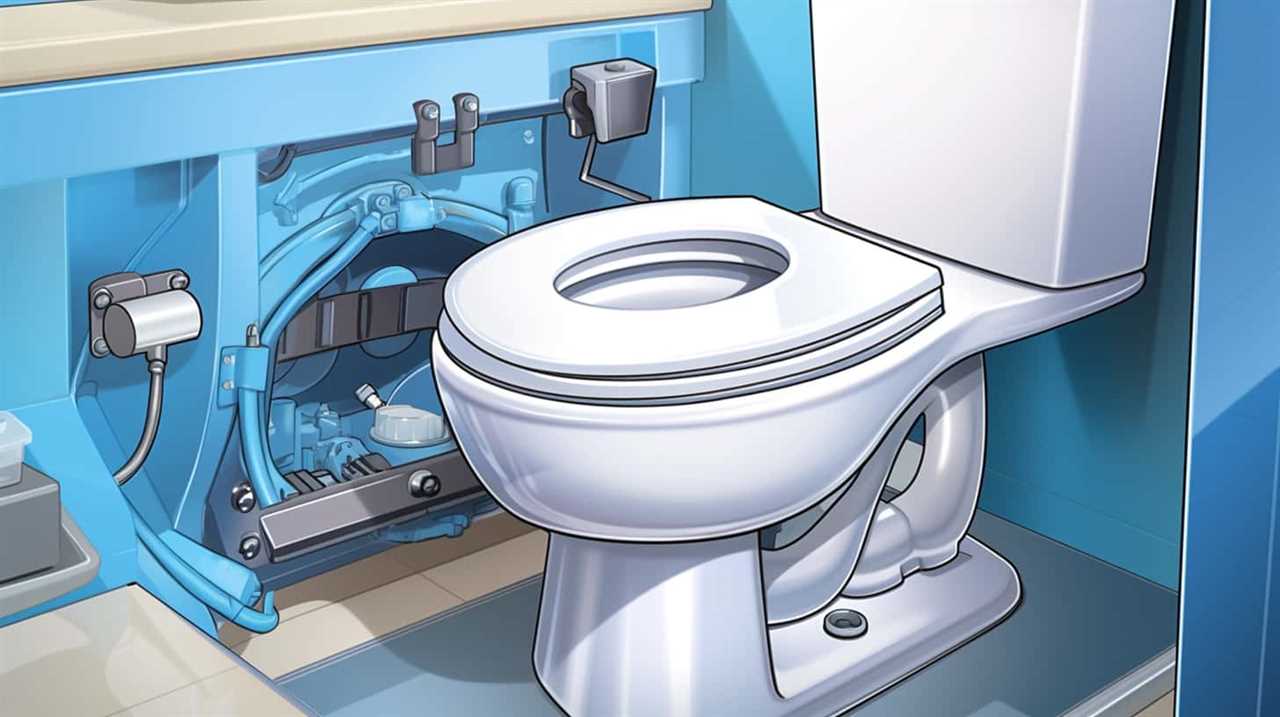
Additionally, using the appropriate cleaning techniques is essential. Avoid using harsh chemicals or abrasive cleaners that can damage the toilet’s plumbing system. Instead, opt for mild cleaning agents and non-abrasive brushes to remove any build-up or residue. Regularly flushing the toilet with water can also help prevent clogs by keeping the pipes clear.
By maintaining a consistent cleaning routine and employing proper cleaning techniques, you can minimize the risk of toilet clogs and ensure the longevity of your toilet’s functionality.
In the following section, we’ll discuss the importance of making informed decisions about coffee grounds disposal.
Conclusion: Making Informed Decisions About Coffee Grounds Disposal
How can we make informed decisions about disposing of coffee grounds? When it comes to the environmental impact of coffee grounds disposal, it’s crucial to consider sustainable solutions. One such solution is composting coffee grounds. Here are some key points to consider:

- Composting coffee grounds not only reduces waste but also enriches the soil, providing essential nutrients for plants.
- By composting coffee grounds, we can divert them from landfills, reducing methane emissions and helping combat climate change.
- Compost made from coffee grounds can be used in gardens, promoting healthier plant growth and reducing the need for synthetic fertilizers.
- Composting coffee grounds is a simple and cost-effective practice that anyone can adopt, contributing to a more sustainable lifestyle.
- When coffee grounds are composted, they break down naturally, creating a valuable resource for our gardens while minimizing waste.
Frequently Asked Questions
Can I Pour Coffee Grounds Down the Kitchen Sink Instead of the Toilet?
Pouring coffee grounds down the sink is not recommended as it can lead to clogs and plumbing issues. There are alternative ways to dispose of coffee grounds, such as composting or using them as a natural fertilizer.
Are Coffee Grounds Harmful to the Environment if Flushed Down the Toilet?
Coffee grounds flushed down the toilet can have harmful effects on the environment. They contribute to clogged pipes and can disrupt wastewater treatment systems. Proper disposal, such as composting or disposing in the trash, is recommended to minimize their environmental impact.
Can Coffee Grounds Damage Septic Systems or Sewage Treatment Plants?
Coffee grounds can cause damage to septic tanks and sewage treatment plants. They can clog pipes and disrupt the natural processes of these systems. It is important to dispose of coffee grounds properly to prevent these issues.
Is It Safe to Use a Garbage Disposal to Dispose of Coffee Grounds?
Using a garbage disposal to dispose of coffee grounds is generally safe, but it’s important to maintain the disposal properly. Additionally, coffee grounds can be repurposed as fertilizer or used for exfoliating skin.
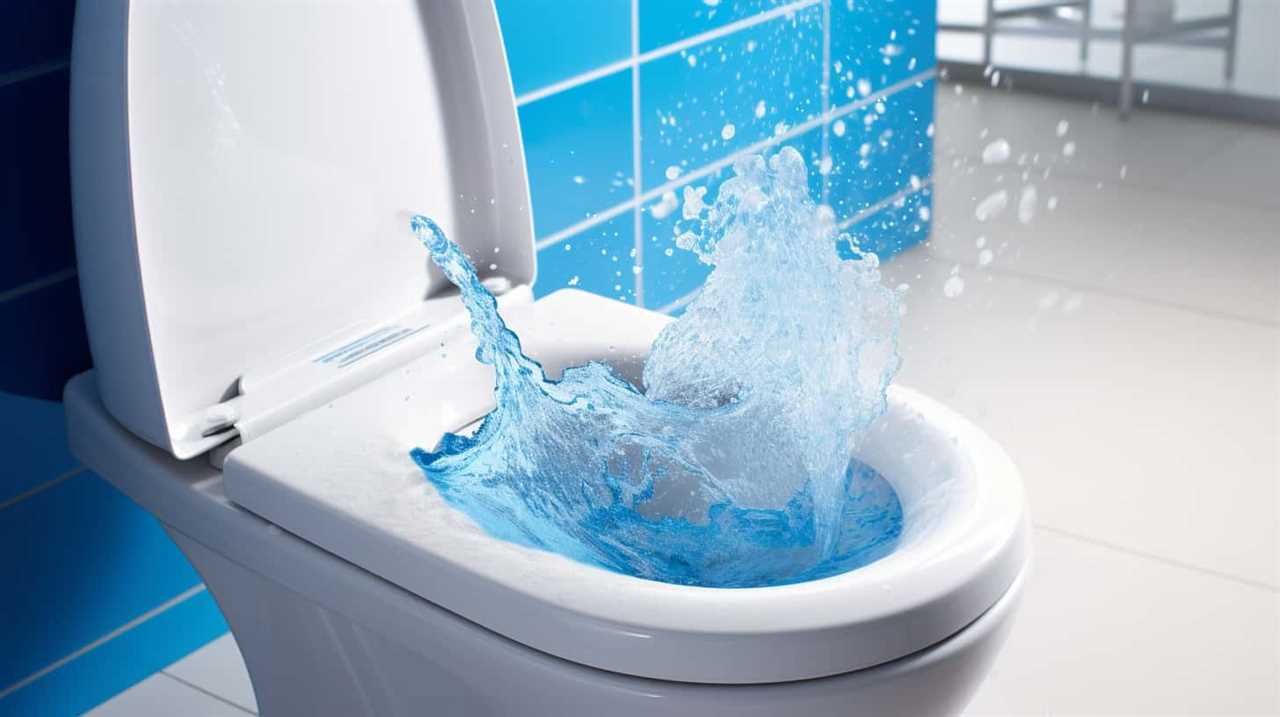
Are There Any Benefits to Using Coffee Grounds in Gardening or Composting?
Using coffee grounds in gardening and composting has numerous benefits. They improve soil fertility and act as a natural pest repellent. Incorporating coffee grounds into these practices can greatly enhance plant growth and overall garden health.
Conclusion
In conclusion, it’s important to avoid flushing coffee grounds down the toilet to prevent potential clogs and damage to your plumbing system.
Did you know that coffee grounds can accumulate and form blockages in pipes, leading to costly repairs?
By properly disposing of coffee grounds in alternative ways, such as composting or throwing them in the trash, you can help maintain the functionality of your toilet and avoid unnecessary plumbing issues.
